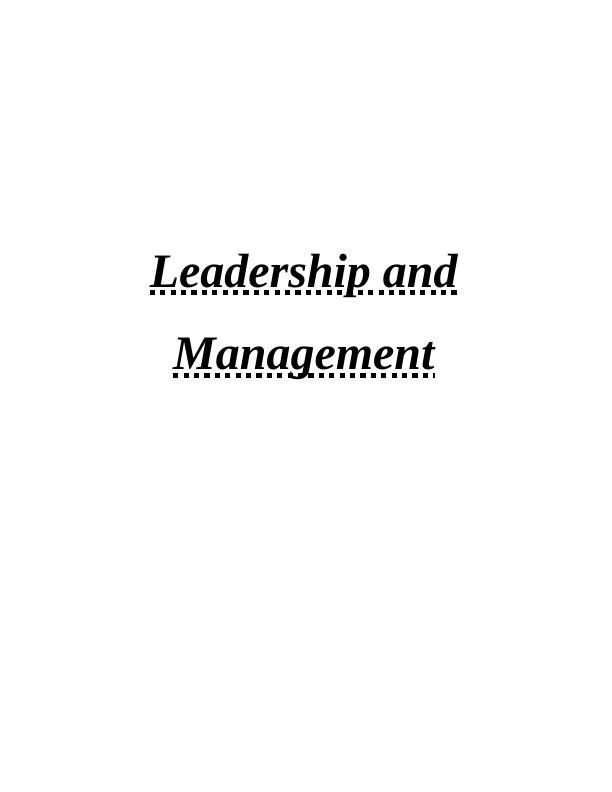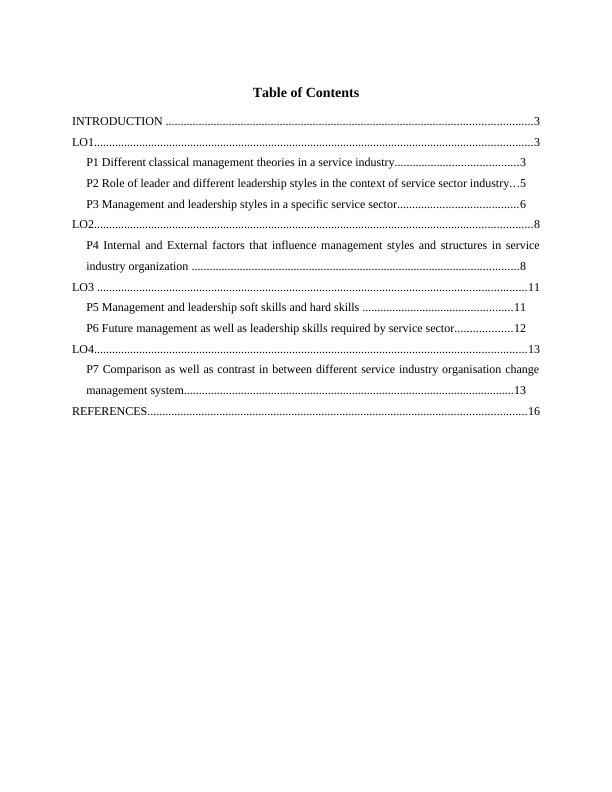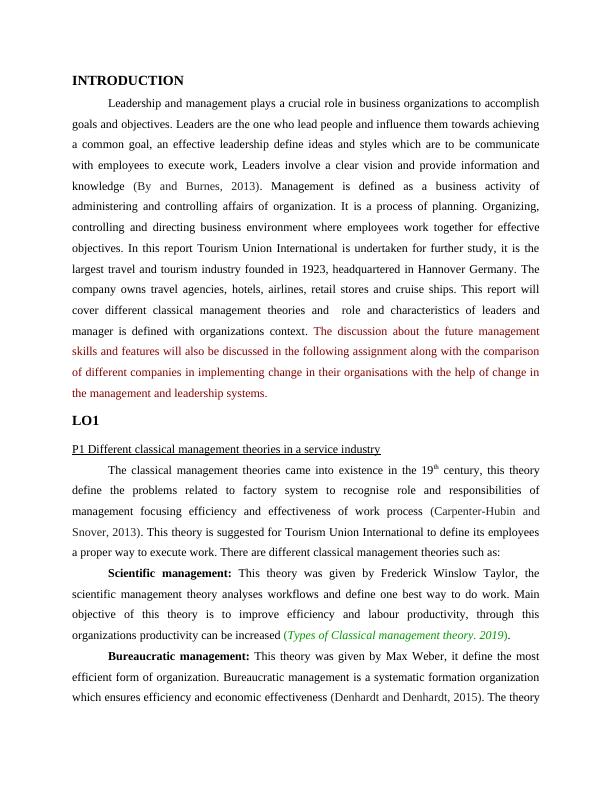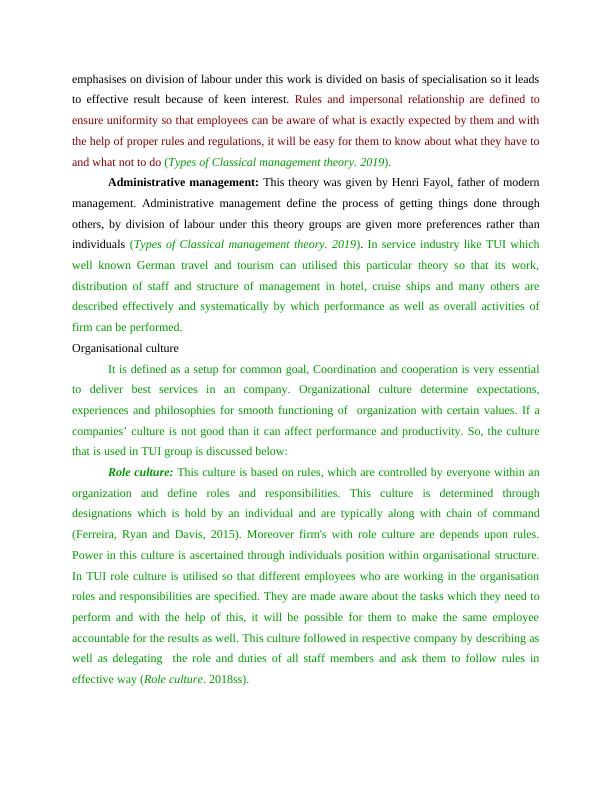Ask a question from expert
P1 Different classical management theories in a service industry
17 Pages5965 Words165 Views
Added on 2021-02-21
P1 Different classical management theories in a service industry
Added on 2021-02-21
BookmarkShareRelated Documents
Leadership andManagement

Table of ContentsINTRODUCTION ..........................................................................................................................3LO1..................................................................................................................................................3P1 Different classical management theories in a service industry.........................................3P2 Role of leader and different leadership styles in the context of service sector industry...5P3 Management and leadership styles in a specific service sector........................................6LO2..................................................................................................................................................8P4 Internal and External factors that influence management styles and structures in serviceindustry organization .............................................................................................................8LO3 ...............................................................................................................................................11P5 Management and leadership soft skills and hard skills ..................................................11P6 Future management as well as leadership skills required by service sector...................12LO4................................................................................................................................................13P7 Comparison as well as contrast in between different service industry organisation changemanagement system..............................................................................................................13REFERENCES..............................................................................................................................16

INTRODUCTION Leadership and management plays a crucial role in business organizations to accomplishgoals and objectives. Leaders are the one who lead people and influence them towards achievinga common goal, an effective leadership define ideas and styles which are to be communicatewith employees to execute work, Leaders involve a clear vision and provide information andknowledge (By and Burnes, 2013). Management is defined as a business activity ofadministering and controlling affairs of organization. It is a process of planning. Organizing,controlling and directing business environment where employees work together for effectiveobjectives. In this report Tourism Union International is undertaken for further study, it is thelargest travel and tourism industry founded in 1923, headquartered in Hannover Germany. Thecompany owns travel agencies, hotels, airlines, retail stores and cruise ships. This report willcover different classical management theories and role and characteristics of leaders andmanager is defined with organizations context. The discussion about the future managementskills and features will also be discussed in the following assignment along with the comparisonof different companies in implementing change in their organisations with the help of change inthe management and leadership systems. LO1P1 Different classical management theories in a service industryThe classical management theories came into existence in the 19th century, this theorydefine the problems related to factory system to recognise role and responsibilities ofmanagement focusing efficiency and effectiveness of work process (Carpenter-Hubin andSnover, 2013). This theory is suggested for Tourism Union International to define its employeesa proper way to execute work. There are different classical management theories such as:Scientific management: This theory was given by Frederick Winslow Taylor, thescientific management theory analyses workflows and define one best way to do work. Mainobjective of this theory is to improve efficiency and labour productivity, through thisorganizations productivity can be increased (Types of Classical management theory. 2019). Bureaucratic management: This theory was given by Max Weber, it define the mostefficient form of organization. Bureaucratic management is a systematic formation organizationwhich ensures efficiency and economic effectiveness (Denhardt and Denhardt, 2015). The theory

emphasises on division of labour under this work is divided on basis of specialisation so it leadsto effective result because of keen interest. Rules and impersonal relationship are defined toensure uniformity so that employees can be aware of what is exactly expected by them and withthe help of proper rules and regulations, it will be easy for them to know about what they have toand what not to do (Types of Classical management theory. 2019). Administrative management: This theory was given by Henri Fayol, father of modernmanagement. Administrative management define the process of getting things done throughothers, by division of labour under this theory groups are given more preferences rather thanindividuals (Types of Classical management theory. 2019). In service industry like TUI whichwell known German travel and tourism can utilised this particular theory so that its work,distribution of staff and structure of management in hotel, cruise ships and many others aredescribed effectively and systematically by which performance as well as overall activities offirm can be performed. Organisational culture It is defined as a setup for common goal, Coordination and cooperation is very essentialto deliver best services in an company. Organizational culture determine expectations,experiences and philosophies for smooth functioning of organization with certain values. If acompanies’ culture is not good than it can affect performance and productivity. So, the culturethat is used in TUI group is discussed below:Role culture: This culture is based on rules, which are controlled by everyone within anorganization and define roles and responsibilities. This culture is determined throughdesignations which is hold by an individual and are typically along with chain of command(Ferreira, Ryan and Davis, 2015). Moreover firm's with role culture are depends upon rules.Power in this culture is ascertained through individuals position within organisational structure.In TUI role culture is utilised so that different employees who are working in the organisationroles and responsibilities are specified. They are made aware about the tasks which they need toperform and with the help of this, it will be possible for them to make the same employeeaccountable for the results as well. This culture followed in respective company by describing aswell as delegating the role and duties of all staff members and ask them to follow rules ineffective way (Role culture. 2018ss).

End of preview
Want to access all the pages? Upload your documents or become a member.
Related Documents
Leadership and Management for Service Industries Assignment Samplelg...
|16
|5121
|83
Leadership & Management for Service Industries: PDFlg...
|10
|2539
|446
Leadership and Management in Service Industrieslg...
|13
|4260
|79
(solved) Leadership and Management for Service Industries : Doclg...
|10
|1791
|469
Leadership and Management in Service Industrieslg...
|13
|4381
|36
Classical Management Theories and Leadership Styles in the Hospitality Industrylg...
|17
|5643
|452